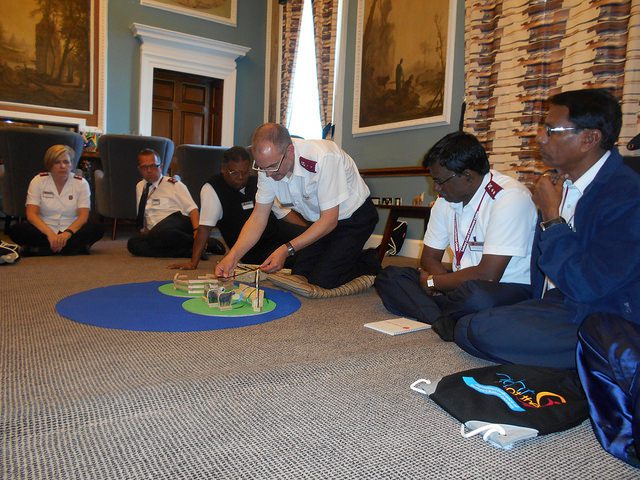Listen to this article
Listen to this article
Loading
Play
Pause
Options
0:00
-:--
1x
Playback Speed- 0.5
- 0.6
- 0.7
- 0.8
- 0.9
- 1
- 1.1
- 1.2
- 1.3
- 1.5
- 2
Audio Language
- English
- French
- German
- Italian
- Spanish
Open text
on the corner “an open letter to the proclaimers of the resurrection”. byrobertdocter,editor-in-chief. it was early morning. the sun, having crept over the mountains surrounding the galilean sea, sent its golden path across the water to illuminate a single man standing on the shore building a fire. he looked out about 100 yards from shore at a fishing boat containing a half a dozen or so disgruntled men. he called out to the men, who had been talking less about fish and more about the miraculous resurrection of jesus, the one they had followed for three years. “how’s the fishing?” he asked. “awful,” they grumbled in reply. when something’s not working, stop doing it and try something else. so, “throw the net out on the right side of the boat. then you’ll find some.”. the group’s obvious leader, whom some called simon and others called peter, pulled the net into the boat and cast it out as directed. the net began to sink as it filled almost immediately with so many fish they couldn’t pull most of it into the boat. they started rowing to shore, dragging that part they couldn’t get in the boat along the side. john—one of the men who probably best knew jesus—had been looking steadily at the man on the shore. suddenly, he exclaimed: “that’s him—that’s the lord.”. peter, who had been carrying considerable guilt over his self-protective denials of jesus, couldn‘t wait for the slow-moving boat. he jumped over the side and swam to shore. the others struggled to drag the net in. reaching the beach, peter helped them pull it up out of the surf. by this time, jesus had a little fire going and invited them to come over for breakfast. “bring a few fish over with you,” he called. when they had finished eating, jesus said to peter, the disciple who had denied him three times: “simon, son of john, do you truly love me more than these?”. somewhat shocked, peter said: “yes lord! you know i love you.”. jesus said: “feed my lambs.”. a second time jesus said: “simon, son of john, do you truly love me?”. peter replied with some confusion: “yes lord! you know that i love you.”. jesus said: “take care of my sheep!”. a third time, forcefully, he said to him: “do you love me?”. now, with some anxiety, peter said: “lord, you know all things; you know i love you.”. jesus said simply: “feed my sheep.”. then, satisfied with these replies and with denials forgiven, jesus said: “follow me!”. jesus needed to know that they could carry on his work, building a true concept of a loving, living god. he needs to see that in you. he’s asking you the same question. can he trust you with his lambs? will you nurture them, facilitate their development, help them to grow? and will you own the salvation army’s magnificent double role of both spiritual and social salvation? there are many different types of hunger. some need a literal feeding, and some need a feeding of god’s word leading to spiritual transformation. provide both. this was the charge given by jesus to those who would represent him in the field, and this is the charge i give to you—feed the flock that is yours. find the need, both financial and spiritual, in your community. when you nurture someone, you must cherish them. feeding someone is an act of intimacy. figure out a way to nurture that flock. to do so, you must relate to them—especially those very different from you—not from obligation, but from desire. christianity is a relationship religion. be friendly, enjoy everyone, and learn how to say “i’m sorry.” adopt a service mentality. love others. work for justice. build community. help the flock grow. it doesn’t happen by itself. it takes planning and work. teach the current flock how to welcome others. remember, your attitude reflects a pre-disposition to behave in a particular way. attitudes are easily read. what’s your attitude concerning being in the flock-feeding business? develop an attitude of acceptance—unrushed, steady. to nurture genuinely, you must have the identity of care-giver, of an encourager, of a supporter, of someone who will look after the concerns and plights of others. that must be the real you. you can’t fake it. be kind. kindness is contagious. abandon all of your addictions, like promotions, worry, money, control, approval, perfection, power. none of them nurtures sheep. figure out what it means to have a “generous spirit.”. consider it essential to build a strong advisory board made up of community leaders. talk to them. listen to them. they will tell you what the community needs. build programs to meet those needs with funding from the community. be anywhere people find themselves suddenly immersed in hurt. empathize. keep the flag up,. wear your uniform,. say something to some poor sinner every day,. and you will not go far astray. (william booth, april 1911).
Open context player
Close context player
Plays:-Audio plays count
on the corner “an open letter to the proclaimers of the resurrection”. byrobertdocter,editor-in-chief. it was early morning. the sun, having crept over the mountains surrounding the galilean sea, sent its golden path across the water to illuminate a single man standing on the shore building a fire. he looked out about 100 yards from shore at a fishing boat containing a half a dozen or so disgruntled men. he called out to the men, who had been talking less about fish and more about the miraculous resurrection of jesus, the one they had followed for three years. “how’s the fishing?” he asked. “awful,” they grumbled in reply. when something’s not working, stop doing it and try something else. so, “throw the net out on the right side of the boat. then you’ll find some.”. the group’s obvious leader, whom some called simon and others called peter, pulled the net into the boat and cast it out as directed. the net began to sink as it filled almost immediately with so many fish they couldn’t pull most of it into the boat. they started rowing to shore, dragging that part they couldn’t get in the boat along the side. john—one of the men who probably best knew jesus—had been looking steadily at the man on the shore. suddenly, he exclaimed: “that’s him—that’s the lord.”. peter, who had been carrying considerable guilt over his self-protective denials of jesus, couldn‘t wait for the slow-moving boat. he jumped over the side and swam to shore. the others struggled to drag the net in. reaching the beach, peter helped them pull it up out of the surf. by this time, jesus had a little fire going and invited them to come over for breakfast. “bring a few fish over with you,” he called. when they had finished eating, jesus said to peter, the disciple who had denied him three times: “simon, son of john, do you truly love me more than these?”. somewhat shocked, peter said: “yes lord! you know i love you.”. jesus said: “feed my lambs.”. a second time jesus said: “simon, son of john, do you truly love me?”. peter replied with some confusion: “yes lord! you know that i love you.”. jesus said: “take care of my sheep!”. a third time, forcefully, he said to him: “do you love me?”. now, with some anxiety, peter said: “lord, you know all things; you know i love you.”. jesus said simply: “feed my sheep.”. then, satisfied with these replies and with denials forgiven, jesus said: “follow me!”. jesus needed to know that they could carry on his work, building a true concept of a loving, living god. he needs to see that in you. he’s asking you the same question. can he trust you with his lambs? will you nurture them, facilitate their development, help them to grow? and will you own the salvation army’s magnificent double role of both spiritual and social salvation? there are many different types of hunger. some need a literal feeding, and some need a feeding of god’s word leading to spiritual transformation. provide both. this was the charge given by jesus to those who would represent him in the field, and this is the charge i give to you—feed the flock that is yours. find the need, both financial and spiritual, in your community. when you nurture someone, you must cherish them. feeding someone is an act of intimacy. figure out a way to nurture that flock. to do so, you must relate to them—especially those very different from you—not from obligation, but from desire. christianity is a relationship religion. be friendly, enjoy everyone, and learn how to say “i’m sorry.” adopt a service mentality. love others. work for justice. build community. help the flock grow. it doesn’t happen by itself. it takes planning and work. teach the current flock how to welcome others. remember, your attitude reflects a pre-disposition to behave in a particular way. attitudes are easily read. what’s your attitude concerning being in the flock-feeding business? develop an attitude of acceptance—unrushed, steady. to nurture genuinely, you must have the identity of care-giver, of an encourager, of a supporter, of someone who will look after the concerns and plights of others. that must be the real you. you can’t fake it. be kind. kindness is contagious. abandon all of your addictions, like promotions, worry, money, control, approval, perfection, power. none of them nurtures sheep. figure out what it means to have a “generous spirit.”. consider it essential to build a strong advisory board made up of community leaders. talk to them. listen to them. they will tell you what the community needs. build programs to meet those needs with funding from the community. be anywhere people find themselves suddenly immersed in hurt. empathize. keep the flag up,. wear your uniform,. say something to some poor sinner every day,. and you will not go far astray. (william booth, april 1911).
Listen to this article












